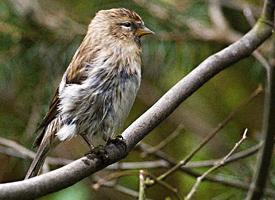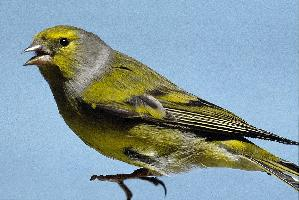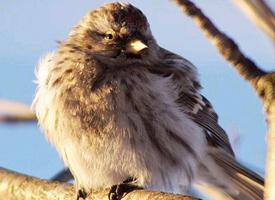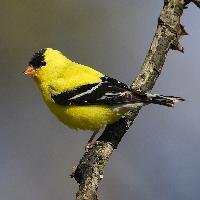
Greutăți și măsuri
| Lungime | de la 12,5 la 14 cm |
|---|---|
| Greutate | de la 9 la 17,5 g |
Descrierea animalului
The Lesser Redpoll (Acanthis flammea cabaret) is a small, captivating bird that belongs to the finch family, widely recognized for its striking appearance and spirited behavior. This bird species is a subspecies of the Common Redpoll but is distinguished by its somewhat smaller size and more limited distribution, primarily residing across parts of Europe and the British Isles. The Lesser Redpoll is a bird of both beauty and resilience, adept at surviving in a variety of habitats, including woodland edges, gardens, and even urban areas where there are sufficient trees and shrubs.One of the most distinguishing features of the Lesser Redpoll is its colorful plumage, which beautifully blends practical camouflage with bursts of vibrant color. The bird's back and wings are adorned with streaks of brown and beige, allowing it to blend seamlessly into its woodland habitats. In contrast, its breast and face are graced with lovely shades of red and pink, a feature that becomes particularly pronounced in males during the breeding season. The bird's belly remains a soft, creamy white, providing a striking contrast to its more vivid markings. Adding to its distinctive appearance, the Lesser Redpoll has a small but sharp black bib under its beak and two bold black lines that run through its eyes, giving it a determined look.
Adult Lesser Redpolls typically measure between 11 to 14 centimeters in length and weigh around 9 to 12 grams. Their size and weight may vary slightly depending on their specific geographic location and the availability of food resources. These birds possess a slender, pointed beak that is perfectly adapted for extracting seeds from thistles, birches, and alders, which constitute the majority of their diet. During the winter months, Lesser Redpolls may also visit garden feeders, showing a particular fondness for nyjer and other small seeds.
Behaviorally, the Lesser Redpoll is known for its lively and gregarious nature. These birds are often observed in small flocks, especially during the non-breeding season, when they roam in search of food. Their flight is undulating and light, characterized by a series of rapid wingbeats followed by a brief glide. On the ground, they move with an agile and somewhat bouncy gait, often flitting from branch to branch in search of food.
The breeding season heralds a shift in the Lesser Redpoll's social behavior, as pairs become more territorial and focused on the construction of their nests. The female primarily undertakes the building of the nest, which is a delicate structure of twigs, moss, and grasses, lined with softer materials like feathers and animal fur. It is usually situated in the fork of a tree or bush, hidden from predators and the elements. The female lays between 4 to 6 eggs, which she incubates for about 10 to 14 days. Both parents are involved in feeding the chicks, which fledge approximately two weeks after hatching.
Despite facing challenges such as habitat loss and climate change, the Lesser Redpoll has demonstrated remarkable adaptability, continuing to thrive in a variety of environments. Its presence adds a touch of color and vitality to its surroundings, making it a cherished sight among birdwatchers and nature enthusiasts. As a species, the Lesser Redpoll serves as a reminder of the beauty and resilience of the natural world, and the importance of conserving the habitats that sustain such diverse and fascinating life forms.
Animale similare
Fotografii noi cu animale
Top 10 animale
- Dolphin gull (Leucophaeus scoresbii)
- Diana monkey (Cercopithecus diana)
- Moustached guenon (Cercopithecus cephus)
- Greek tortoise (Testudo graeca)
- Stone loach (Barbatula barbatula)
- Galápagos tortoise (Geochelone nigra complex)
- Japanese macaque (Macaca fuscata)
- Russian tortoise (Testudo horsfieldii)
- Common flying dragon (Draco volans)
- Galápagos penguin (Spheniscus mendiculus)


